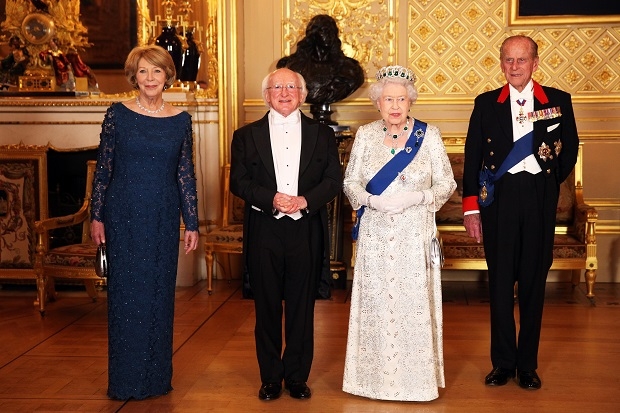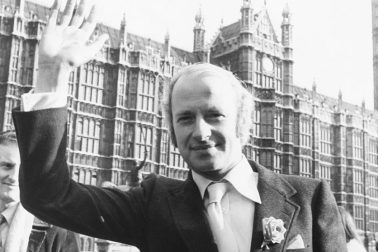As the Irish president is making the first visit to the United Kingdom by an Irish head of state, some people have asked what’s taken him so long. The Spectator’s archive offers some insights into the two countries’ rocky relationship.
The British government has often been criticised for not doing more to mitigate the effects of the Irish potato blight in the 1840s. The Spectator agreed the government could have done more, but also voiced suspicions about one of Ireland’s national champions, Daniel O’Connell. He’s known as The Liberator in Ireland and was one of the early campaigners for the repeal of the Act of Union. In 1846, this magazine accused him of putting political ambition ahead of the welfare of the people:
‘He himself, by countenancing a trumpery obstruction to the reasonable forms of Parliament, actually impedes the passing of the measure which will for ever secure that greater supply of corn, which may work a thorough change in the diet and social condition of the Irish people. But to forward the material interests of the country is not so advantageous to his objects as the rousing of her violent passions is.’
Another Irish national hero, Charles Stewart Parnell, was also given short shrift. As president of the Land League, he represented Ireland’s tenant farmers, and from the mid-19th century, the farmers got more violent, attacking tax collectors and committing vandalism. The Spectator said Parnell had incited the violence of the agrarian outrages.
‘He considered the outrages, to use the phrase of his own paper — the United Ireland — as mere incidents of the campaign, and cared no more to stop them than did Marat when he viewed with sombre acquiescence the massacres of the Terror. This may be a statesmanlike and reasonable way of looking at bloodshed, and incidentally useful in carrying out a political purpose; but, at any rate, it is not the attitude of one who has always detested outrage as English Home-rulers try to fancy that Mr Parnell has done.’
Ireland was briefly allowed to govern itself in 1914, but home rule was suspended when the First World War broke out. Republicans got angrier and angrier and rebelled in 1916, taking over various buildings in Dublin and killing a few unarmed soldiers and civilians in the process. The Spectator took a hard line:
‘We have no desire to clamour for any man’s blood, or that the British nation should do anything for mere purposes of revenge. We cannot doubt, however, that if any men ever deserved to be shot for rebellion they were [Tom] Clarke, [Patrick] Pearse, and [Thomas] MacDonagh. They were in communication with a foreign enemy, and took money and supplies from them. They chose what they thought was a good opportunity for stabbing the nation of which they were citizens in the back, and finally they carried out the rising with a brutal callousness which has not been surpassed in the history of revolutions.’
The government should not be cowed by the potential mark it might leave on the Irish psyche, the article continues:
‘We shall be told, of course, that shooting rebels is no remedy, that Irishmen have long memories, and that if the Government act strongly Ireland will never compose her quarrel with England and Scotland. We do not believe a word of such pleas for weakness. Murderers are murderers even when concealed under such aliases as “patriots”, “soldiers of the republic” and so forth.’
It does however express a hope that the government will deal more gently with rank and file rebels. The response to the Easter Rising was severe – 90 people were sentenced to death and hundreds more were imprisoned. Violence ebbed and flowed for much of the 20th century. By 1981, The Spectator was writing:
‘Prisoners in the Maze are once more smearing excrement over their cell walls. Murder and arson and bombing remain commonplace in Ulster. Throughout Ireland, north and south, gangs of yobs, justified by tribalism and sanctified by religion, maraud and pillage, kill, torture, steal and extort. With enduring success, the hoodlums pass themselves off as patriots, loyalists, Christians and Irish.’
There needed to be a change, the article said, and Ulster may prove impossible to govern well ‘as long as Britain continues to assert that, under no circumstances, will it get out without the permission of a majority of that most artificial Province’.
At the Good Friday Agreement in 1998, Bruce Anderson was impressed by the way Tony Blair swept in, deus ex machine, and took control of the talks. There were still details to resolve, but the peace process had reached a climax, he said; that did not mean to say that peace had been achieved. And by August 2001, The Spectator was very strict again. Peace had been negotiated on the basis that the IRA would be allowed into mainstream politics if it renounced terrorism, but there was no sign that it had begun disarming.
‘Decommissioning was a moral pillar of the peace process, and remains essential to its success. But as long as the British government behaves in such a spineless and appeasing fashion, why should the IRA feel under any pressure? Mr Blair took much of the credit for the Good Friday Agreement, and had earned it. Three and a half years later, it is crumbling away because of his government’s pusillanimity. He now deserves the blame.’






Comments